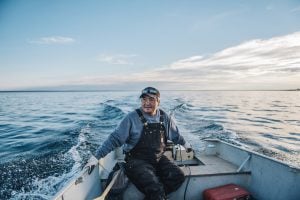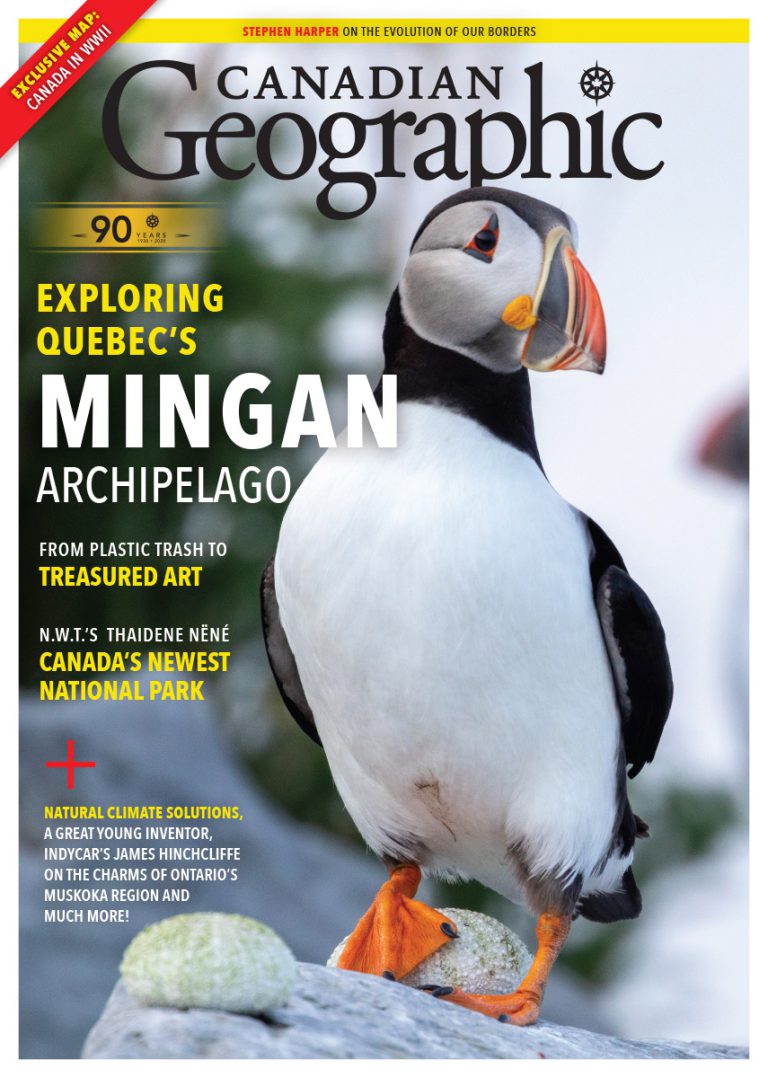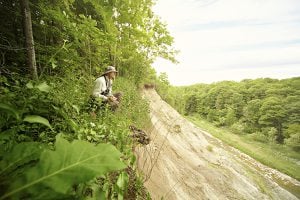
Environment
Inside the fight to protect the Arctic’s “Water Heart”
How the Sahtuto’ine Dene of Déline created the Tsá Tué Biosphere Reserve, the world’s first such UNESCO site managed by an Indigenous community
- 1693 words
- 7 minutes
Places
The new Thaidene Nëné National Park Reserve in the Northwest Territories is the heart of sacred Denesǫłiné homeland and a prophesied final refuge of clean water and ecological integrity in North America

On a splotch of sandy beach leading to the blue-green waters of Great Slave — the deepest lake in North America and also the cleanest, according to Dene who’ve spent a lifetime dipping their cups into it — two carefree teenagers sling fishing rods for trout while their leader Terri Enzoe worries.
They are all Ni Hat’Ni Dene Rangers, guardians of the land, a conservation program led by the Denes??iné of ?utsël K’é, Northwest Territories. Fishing is in their job description, a way of knowing the bounties of their homeland so they can inherit the responsibilities of its stewardship. Both 16-year-olds have moved from ?utsël K’é to larger centres where they’ve lost their language to English and virtual realities, yet that world is dissolving for them here.
Amid the sheared red cliffs, narrow channels and mysterious depths of Great Slave Lake’s much-vaunted East Arm, they hunger for the knowledge of their ancestors. They hunger for what Enzoe knows.
The compact, quiet-but-not-shy hunter was born 60 years ago on the treeless, central Barren Lands, most likely in a caribou-hide tent, she says.
She and her family followed the once-teeming barren ground caribou herds southwest across the treeline to overwinter here among the white and black spruce of this upland boreal region, then back to the peat- and lichen-carpeted plains of the caribou’s summer calving grounds. Both tundra and taiga are in her bones, nurturing a wordless communication with these unspoiled waters and the moose and muskox she takes down with precision. Yet on this sweltering day in late July, it’s a modern InReach satellite device that has just informed her of her sister’s medevac from ?utsël K’é to Yellowknife. Dora Enzoe, one of many in a long line of leaders who have fought to preserve Denes??iné lands and culture, is dying of breast cancer.
The former chief lobbied hard for the community’s shared vision of a conservation economy, where the rangers, ecotourism, cultural exchanges, and fish and water monitoring provide jobs that sustain both the environment and its people. “We have the plan,” she said in a 2013 Hill Times opinion piece. “We know we offer a way forward that will provide the best of both worlds.”
There’s little that Terri Enzoe can do for her sister from the rangers’ camp, a humble, plywood cabin about an hour’s boat ride from ?utsël K’é, but earlier she’d made a spiritual quest to the mouth of the Lockhart River, offering pinches of tobacco along the way as is the steadfast protocol, with her in mind. “When we pass the deepest water, I tell the kids this is where you have to be quiet, this is where you pay the water because we’re on a different part of the lake now,” she says. “It’s just the way I was taught and now I’m teaching the younger ones.”
As their patrol boat entered Kache, the wide, sandy delta where the Lockhart River deposits into Great Slave Lake, Enzoe’s son Kyle, a longtime ranger, gathered samples for water quality monitoring while his mother gathered the sacred waters, said to have healing properties conferred by the Old Lady of the Falls, to give to her sister.


The Old Lady, Grandmother, Granny, Tsankui Theda, however she is called, is a watery deity borne of ancient times who’s said to live in a difficult-to-reach, frothy waterfall along the Lockhart, or Deshun Bedézé (Granny’s River).
Almost every Denes??iné knows some version of her story, which, astonishingly, harkens back 11,700 years to the Pleistocene epoch when beavers the size of bears (Castoroides ohioensis) roamed. The ailing Old Lady had asked for help, wanting blood from a giant beaver just harvested, but was denied. She refused to leave, and her lower body was absorbed into the rock of the falls where she said she’d stay until the end of time, helping people heal and ensuring an abundance of food and water in exchange for not disturbing her sacred abode.
It’s a creed that forms the spiritual apex for the 300-some people of the fly-in community of ?utsël K’é and another 600 in their Denes??iné (Chipewyan) diaspora, many of whom hang Tsankui Theda’s image next to the Virgin Mary in their homes. This hallowed grandmother figure has been a driving force, a mandate, behind a modern-day crusade to forever protect the biodiversity of her vast ecosystem. She is woven into a Denes??iné prophecy that says her waters will be a sanctuary when the globe reaches peak ecological destruction.
“We are creating a refuge that hopefully we will never need,” says Stephen Nitah, a former chief of ?utsël K’é who became lead negotiator for his people’s efforts to preserve the Land of the Ancestors, Thaidene Nëné, as Canada’s 47th national park.
“The prophecy speaks about a time in the future where the economy as we know it today collapses, societal structure as we know it collapses, food security is non-existent, a great migration of people will be looking to places that have water,” Nitah says. “You need to find deep water holes because fish will be our last sources of food and the water table is going to drop. And we’re starting to see signs of that already.”

Located in North America’s subarctic central Barren Lands, a vast expanse between Great Slave Lake and Hudson Bay, Thaidene Nëné stretches 400 kilometres across the 62nd parallel, sliced in a northwest-southeast direction by the treeline and the permafrost line. Two major drainage basins, the Mackenzie watershed, leading to the Arctic Ocean, and the Thelon watershed, emptying into Hudson Bay, support incredible biodiversity including birds, waterfowl, fish, small mammals, caribou, muskox, moose, wolverine and grizzlies.
Each fall, the Barrens burst into a riot of crimson when ground leaves turn and vitamin-rich berries erupt. Preserving that veritable breadbasket has required unwavering vigilance. Guided by the cultural axiom of Tsankui Theda, the ?utsël K’é Denes??iné have waged a strategic 50-year conservation battle that began, ironically, by thwarting federal government efforts in 1970 to turn Thaidene Nëné into a national park.
Nitah says the relationship then between Parks Canada and Indigenous Peoples was “dark and ugly.” Not wanting to lose their harvesting way of life to park expropriation, the late chief Pierre Catholique issued a resounding no to the proposal. Nonetheless, as power companies started staking out potential hydro sources along the waterways, the federal government permanently withdrew 7,349 square kilometres of potential parkland, including the Lockhart River, from staking, exploration and development. Hereditary chief Joe Lockhart famously told federal officials to “pack up their maps and go” during a second negotiation attempt in 1982.
Then came diamond mines.
By the late 1990s, two mines built along the migration route of the barren ground caribou coincided with the start of the herds’ precipitous decline and spurred interest in settling land claims and self-government agreements. ?utsël K’é is part of the Akaitcho process, a modern-day negotiation between five First Nations of the southeastern Northwest Territories and the federal and territorial governments to reinterpret Treaty 8.
?utsël K’é Elders observed that their Gwich’in and Inuvialuit neighbours were assigned land quantums (discontinuous pockets of surface and subsurface rights to areas that don’t allow for intact biospheres) under their final deals. Worried about preserving caribou habitat and their sacred watershed, the Elders suggested a park would allow for broader protections. A new conservation strategy was born.
Then-chief Felix Lockhart opened the door to Parks Canada discussions in 2000, but only if his people would participate as full partners without colonial overlays. Talks began in earnest, and within seven years the park study area ballooned to more than 33,000 square kilometres. But putting that giant swath of potential park under interim land withdrawal did not stop industry from knocking.
Dezé Energy Corporation proposed stringing hydro lines across Tsankui Theda’s watershed to power the diamond mines. All former chiefs and Elders from ?utsël K’é made impassioned presentations to the Mackenzie Valley Environmental Impact Review Board — Elder George Marlowe spoke while holding a jar of water from Kache — in opposition.
The project quietly died after Dezé was ordered in 2010 to find alternative routes. Three years earlier, the people of ?utsël K’é had pleaded against Ur-Energy’s proposal to drill exploration holes in the adjacent Upper Thelon Basin, “the place where God began,” according to them. The review board rejected Ur’s proposal, saying it would threaten the spiritual and cultural well-being of the Dene.

Whether these decisions were influenced by divine intervention is a matter of opinion, but the outcomes were unequivocal. The ?utsël K’é Dene First Nation initialled two establishment agreements that formed the basis for conserving Thaidene Nëné — one with Parks Canada in 2013, the other with the Northwest Territories government in 2018 — stating that mining, oil and gas, mineral exploration, large-scale commercial fishing and large-scale hydroelectric projects will never be allowed inside a total protected area of 26,376 square kilometres, almost half the size of Nova Scotia.
A core area of 14,305 square kilometres is designated under the National Parks Act. The territorial government designated an additional adjacent 8,906 square kilometres as a protected area and 3,165 square kilometres as a wildlife conservation area where small-scale hydro development, quarrying and infrastructure corridors are allowed, but only to service the park or ?utsël K’é. All Indigenous rights to hunt, fish, trap, gather, travel and make cabins and trails remain intact.
The ?utsël K’é Dene First Nation voted overwhelmingly in favour of the agreements in February 2019, leading to an official signing ceremony in August of that year. Signatories to the new Thaidene Nëné National Park Reserve include Canada, the Northwest Territories government, ?utsël K’é Dene First Nation, the Northwest Territory Métis Nation, the Deninu K’ue First Nation and the Yellowknives Dene First Nation. Together with the adjacent Thelon Wildlife Sanctuary, a pristine ecological system spanning more than 72,800 square kilometres is protected.
The most striking departure from past federal parks is that Thaidene Nëné will be co-managed by consensus through a board represented by federal, territorial and Indigenous governments. “Co-management is critically important,” Catherine McKenna, then federal minister of environment and climate change, said in an interview last August.
Ottawa has pledged $40 million over 12 years for infrastructure and operations of the park and $3.4 million annually after that, which will help support an anticipated 18 full-time jobs and beef up the work of the Ni Hat’Ni Dene Rangers. McKenna has said that if Canada is going to meet its target of protecting 17 per cent of its lands by 2020, “it needs to be through new partnerships with Indigenous people.”
Beyond government partnerships, Thaidene Nëné has received ongoing support from several conservation groups including Nature United, the Canadian affiliate of the environmental non-profit organization The Nature Conservancy. Tracey Williams is Nature United’s N.W.T. conservation lead. Her organization raised $15 million from its global network of donors, matched by the federal government, to create a $30-million Thaidene Nëné fund. “By using only the interest accrued, the money will ensure the ?utsël K’é Dene First Nation has enough funding to perpetually support its roles and responsibilities as a co-governing partner, something that’s very important to them,” Williams says.


Passing on knowledge informed by way of life, the Dene ways, through Ni Hat’Ni Dene Rangers such as Terri and Kyle Enzoe, will be key. Stories of the healing powers of Tsankui Theda are legion. As she lights another cigarette, Terri Enzoe says she visited the falls when her youngest son was four months old and afflicted with a skin disorder that specialists could not diagnose. “You sit there and do our prayers, and I brought water home and I bathed him in there. I did that until I used all the water, and it just disappeared. He has a lot of respect for the falls now.” She says she has spoken with a man from southern Canada who has returned to Kache twice to give thanks after he was cured of cancer.
Sadly, that was not to be the case for her sister. The day before the park was proclaimed, Dora Enzoe was buried in ?utsël K’é. During the signing ceremony, Chief Darryl Marlowe dedicated the day to her and her family. “She is one of our ancestors now, and we will do our best to honour her commitment to protecting this land and the way of life of her people,” he said.
Having an Elder die has been compared to losing an encyclopedia. With Thaidene Nëné the Land of the Ancestors, new chapters are being written.
Are you passionate about Canadian geography?
You can support Canadian Geographic in 3 ways:

This story is from the July/August 2020 Issue

Environment
How the Sahtuto’ine Dene of Déline created the Tsá Tué Biosphere Reserve, the world’s first such UNESCO site managed by an Indigenous community

Places
In Banff National Park, Alberta, as in protected areas across the country, managers find it difficult to balance the desire of people to experience wilderness with an imperative to conserve it

Places
The park nearly 50 years in the making has officially been established in the Northwest Territories

Places
It’s an ambitious plan: take the traditional Parks Canada wilderness concept and plunk it in the country’s largest city. But can Toronto’s Rouge National Urban Park help balance city life with wildlife?